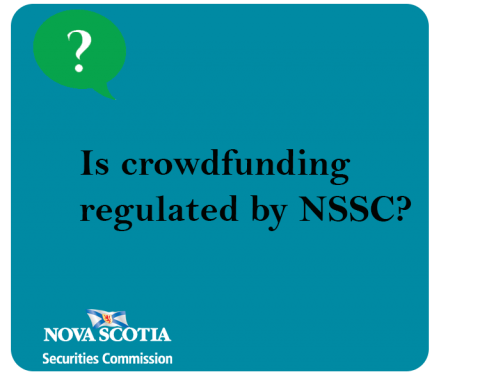Submitted by nsscadmin on

Some forms of crowdfunding are regulated in Nova Scotia, but not all of them.
Some common types of crowdfunding involves a business venture or project receiving funding from a large group of people in exchange for products or services in return or donations. These types of crowdfunding are not regulated by the Nova Scotia Securities Commission. So, if you’re taking part in a Kickstarter crowdfunding for a new board game or social enterprise in Halifax and offer a copy of the game or services from the new enterprise you don’t have to worry about following any regulations set by NSSC.
The NSSC regulates securities based crowdfunding, such as equity or debt, and has done so since two new rules were adopted in 2015. Securities based crowdfunding means that for their investment into the company through the crowdfunding portal, the investor is expecting a financial or investment return. Today we will highlight the start-up crowdfunding rule. Investors can receive shares in a start-up or small-business which may provide them with certain benefits such as voting rights at shareholder meetings or dividends if they are offered.
Securities based crowdfunding must be done using a start-up crowdfunding portal listed on our website or through a registered portal or investment or exempt market dealer. You can find the approved list of Start-up Crowdfunding Portals allowed to operate in Nova Scotia here, or you can check to see if they are registered by using the National Registration Search.
The start-up crowdfunding portals in Nova Scotia have to follow one of two schemes.
The first is as a registered dealer. Anyone operating this type of portal must be registered with the NSSC. As a registered dealer they must abide by all rules and regulation set forth by the NSSC. They also have an obligation to ensure the investment products it offers are suitable for their clients.
A start-up crowdfunding portal is not registered with the NSSC, and has limited obligations to investors. They cannot provide investment advice and have no obligation to ensure the investment products they offer are suitable for the client.
Both types of portals must provide a risk acknowledge form to investors summarizing the risks of their investment.
Enterprises raising capital under the start-up crowdfunding have less requirements regarding information provided to investors. For example, an enterprise using start-up crowdfunding is not required to provide financial statements, but may do so.
They are limits set on how much a person may invest in a crowdfunding scheme, and how much can be raised. An investor under a start-up crowdfunding offering may invest up to $1,500. Issuers may raise up to $250,000 per offering or $500,000 per year under the start-up crowdfunding from investors through start-up crowdfunding funding portals.
